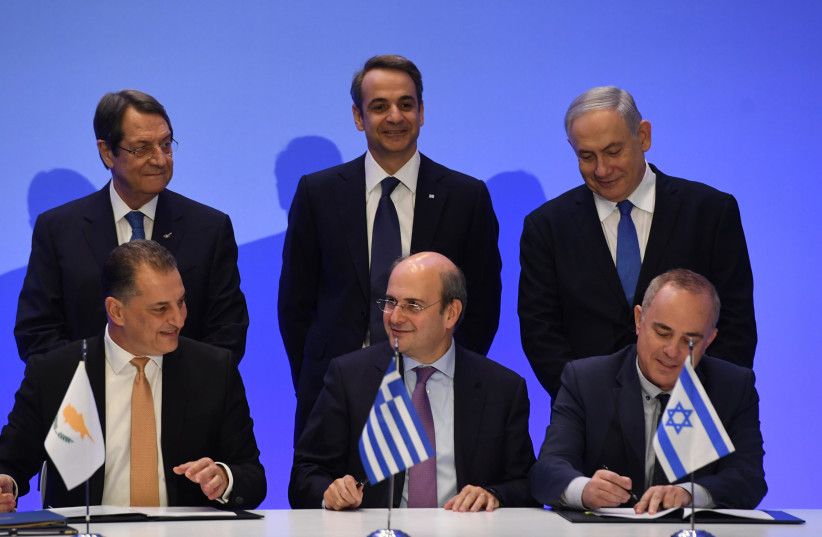The forum includes Egypt, Israel, Greece, Cyprus, Jordan, the Palestinian Authority and Italy.
By LAHAV HARKOV SEPTEMBER 22, 2020 14:32

Energy Ministers of seven countries, including Israel’s Yuval Steinitz, attended an event launching the new East Mediterranean Gas Forum (EMGF) in a virtual event hosted in Cairo on Tuesday morning.
“The blessing of gas brings regional cooperation with Arab and European countries, the first of its kind in history, including contracts to export $30 billion of blue-and-white gas to Jordan and Egypt, and that’s only the beginning,” Steinitz said.
The forum includes Egypt, Israel, Greece, Cyprus, Jordan, the Palestinian Authority and Italy, whose ambassadors, and Egyptian Energy Minister Tarek al-Mulla, signed the EMGF’s charter in Cairo. The ambassadors of countries interested in joining – France as a member and the US and EU as observers – were also in attendance.
Steinitz and al-Mulla initiated the EMGF’s establishment in 2017 following natural gas discoveries off of the coasts of Israel and Egypt. It existed at first to facilitate talks between the different countries, but Tuesday’s ceremony established it as an intergovernmental organization.
The joint declaration on the EMGF’s launch said it “aims to serve as a platform that brings together gas producers, consumers and transit countries to create a shared vision and establish a structured systematic policy dialogue on natural gas, leading to the development of a sustainable regional gas market and unlocking the full gas resource potential in the region for the benefit and welfare of its people.” The forum also includes a Gas Industry Advisory Committee, an ongoing dialogue between governments and business partners, to help monetize the gas reserves.
The Energy Ministry said Israel’s membership in the forum will give it major advantages in promoting shared goals in the natural gas market’s development and help Israel export gas to its neighbors and to Europe.
On a diplomatic level, it could contribute to further normalization and ties between Israel and countries in the region, and improve Israel’s standing with countries with which it already has diplomatic relations.
The EMGF and gas exploration more broadly is a point of tension between Turkey and other countries in the region, especially Greece and Cyprus. Last year, Turkey claimed areas of the Eastern Mediterranean that Greece and Cyprus control are part of its own exclusive economic zone (EEZ) and its exploration and naval activities in those areas has heightened tensions in the region.
The forum’s launch statement says it will “contribute to advancing regional stability and prosperity, creating an environment of trust…and neighborly relations.”
It also says that any country in the Eastern Mediterranean can apply for membership, and any other country or international organization can apply to be an observer, as long as it shares the EMGF’s goals.
Gabriel Mitchell, an expert on energy and geopolitics in the Eastern Mediterranean at Mitvim- The Israeli Institute For Regional Foreign Policies applauded the EMGF charter’s signing, but warned that recent events have pushed the region’s energy dreams farther out of reach.
“The pandemic triggered a collapse in global energy prices; international companies have frozen their operations in the Eastern Mediterranean,” Mitchel said. “Today, the region’s focus has shifted from energy cooperation to maritime border disputes. Today’s signing is meaningful, but muted by the changing economic and geopolitical landscape.”
